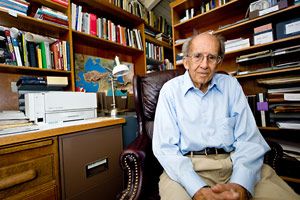Jacqueline Gmach
Born in Tunisia in 1940, Jacqueline Gmach left at the age of 18. Though her family was not directly in danger, the Nazi genocide remains deeply personal to her. She has devoted her career to educating people about its horrors as well as promoting the Jewish culture its executioners tried to obliterate. A scholar with degrees and credentials from institutions ranging from the Sorbonne in Paris to the University of Jerusalem and the University of Montreal, Gmach serves as project director for USC Shoah Foundation’s Testimonies of North Africa and the Middle East project.
UCLA Institute for Pure and Applied Mathematics Teams Up With USC Shoah Foundation
Four applied mathematics undergraduate students are dedicating their summer to a major research project for the USC Shoah Foundation – The Institute for Visual History and Education.
Visual History Archive Featured in New Book
Professor Andrea Pető of Central European University in Budapest has written an article about how to use USC Shoah Foundation’s Visual History Archive in teaching students at the graduate level. The piece appears as a chapter in the seventh volume of Jewish Studies at the Central European University edited by András Kovács and Michael Laurence Miller.
Rwandan Testimonies Add 500 New Terms to Visual History Archive’s Thesaurus
Testimonies of survivors and witnesses of the 1994 Rwandan Tutsi Genocide added to USC Shoah Foundation’s Visual History Archive have resulted in 500 new search terms for the archive’s indexing system.
The index is a controlled vocabulary of more than 50,000 terms that make up the Shoah Foundation’s Thesaurus and that allow detailed searching of the testimonies in the archive.
Armenian Genocide Testimonies to be Incorporated into USC Shoah Foundation Visual History Archive

Restoring memories of the Holocaust
In the nineteen nineties, videotape was the most effective format on which to record the testimonies of Holocaust survivors and other witnesses. But like all physical storage media, tape has a shelf life, and in 2008 the Institute and USC Information Technology Services (ITS) started a multimillion-dollar project to digitize the entire Visual History Archive.
United States
53.092603, 101.425781VHA access point opens at History Meeting House in Warsaw
The History Meeting House in Warsaw has become the first institution in Poland to offer full access to the Archive of the USC Shoah Foundation Institute for Visual History and Education. Nearly 52,000 videotaped testimonies of Holocaust survivors and other witnesses, recorded in 56 countries and in 32 languages—mostly between 1994 and 1999—can now be remotely accessed via an online interface that allows searching and viewing the fully indexed video and related metadata.